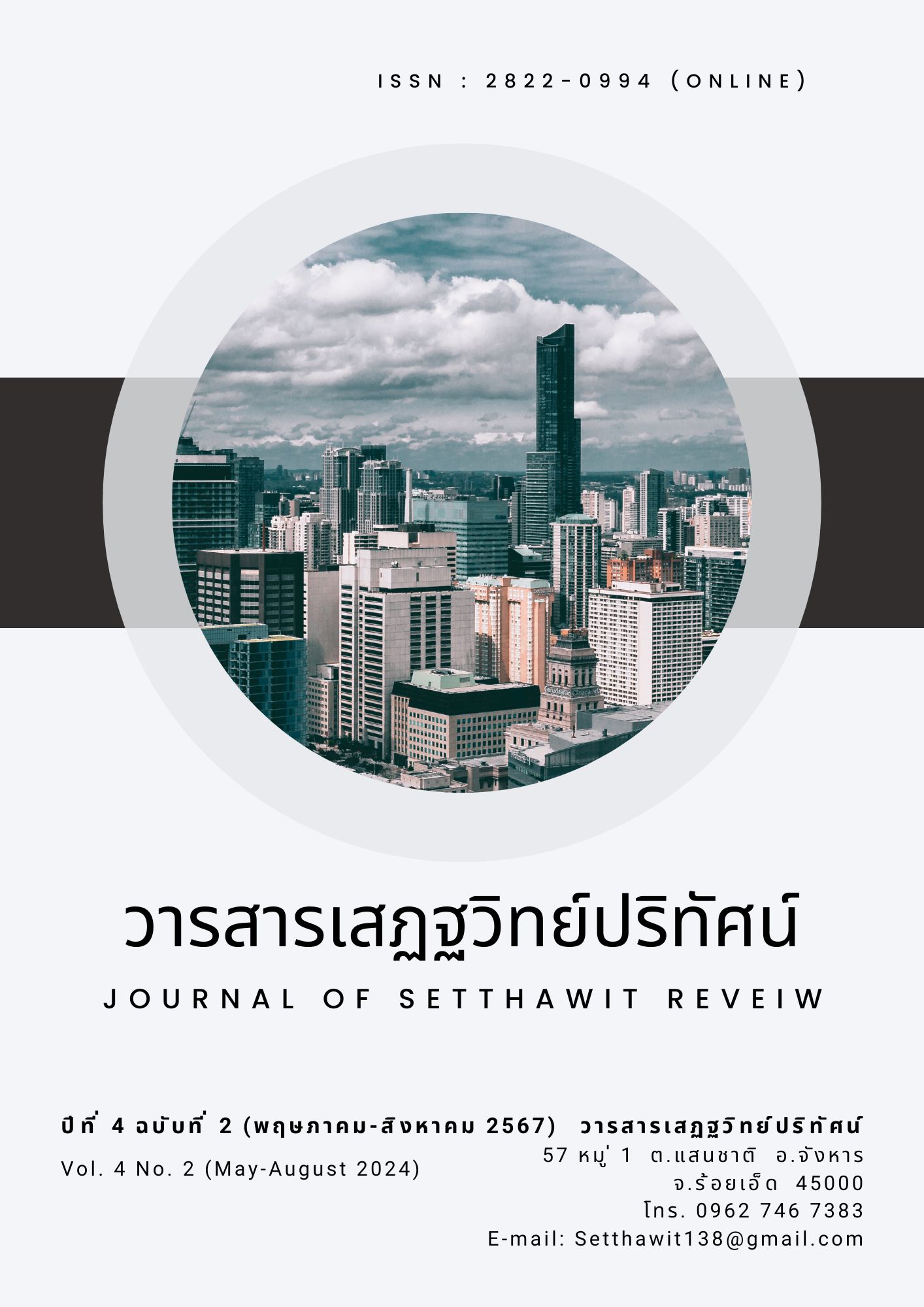The causal relationship model of factors affecting digital leadership of school administrators under the secondary educational service area office Loei Nong Bua Lamphu
Main Article Content
Abstract
The purpose of this research is to 1) study the elements of digital leadership of the administrators, and 2) examine the consistency of the causal relationship model of factors affecting the digital leadership of school administrators under the Secondary Educational Service Area Office in Loei and Nong Bua Lamphu, developed using empirical data.This study involved a sample group of 430 administrators and teachers from educational institutions under the secondary educational service area office Loei Nong Bua Lamphu. They were selected via multistage sampling method. A 5-level rating scale was used to collect data on the aspects of school administrator’s digital leadership. The data was analyzed by using the Confirmatory Factor Analysis and Structural Equation Model:SEM
The result of this research were as follows:
1) Elements of digital leadership for administrators under the secondary educational service area office Loei Nong Bua Lamphu are comprised of four key elements : communication, vision, digital skills and digital culture.
2) The result indicated that the adjusted model was consistent with empirical data. Model validation 2= 81.305, df = 64, P-Value = .0711, RMSEA = .025, CFI = .997,
TLI = .996, SRMR = .017
Article Details
References
กระทรวงศึกษาธิการ.(2563). ประกาศนโยบายและความสำคัญของกระทรวงศึกษาธิการ.กรุงเทพมหานคร: กระทรวงศึกษาธิการ.
กมลวรรณ ตังธนกานนท์, (2558).ระเบียบวิธีสถิติทางการศึกษา. กรุงเทพมหานคร: สำนักพิมพ์จุฬาลงกรณ์ มหาวิทยาลัย.
จิตรกร จันทร์สุข. (2564). การศึกษาองค์ประกอบภาวะผู้นำดิจิทัลสำหรับผู้บริหารโรงเรียนขยายโอกาสทาง การศึกษา สังกัดสำนักงานเขตพื้นที่การศึกษาประถมศึกษาอุดรธานี เขต 3. วารสารวิชาการมหาวิทยาลัยราชภัฏศรีสะเกษ. 15(2), 36-49.
นงลักษณ์ วิรัชชัย. (2558). การวิเคราะห์ทางสถิติขั้นสูงที่เหมาะสมกับการวิจัยทางจิตวิทยาและพฤติกรรมศาสตร์.กรุงเทพมหานคร: จุฬาลงกรณ์มหาวิทยาลัย.
วิทวัส นิดสูงเนิน และคณะ. (2565) การพัฒนาโมเดลสมการโครงสร้างของปัจจัยที่ส่งผลต่อภาวะผู้นำเทคโนโลยีของผู้บริหารสถานศึกษาในยุคดิจิทัล โรงเรียนมัธยมศึกษาในกลุ่มจังหวัดภาคใต้ฝั่งอ่าวไทย สำนักงานคณะกรรมการการศึกษาขั้นพื้นฐาน.วารสารสหวิทยาการมนุษยศาสตร์และสังคมศาสตร์. 5(4), 1638-1658.
สุนทรพจน์ ดำรงพานิช. (2555). โปรแกรม Mplus กับการวิเคราะห์ข้อมูลทางพฤติกรรมศาสตร์และ สังคมศาสตร์. มหาสารคาม: มหาวิทยาลัยมหาสารคาม.
สำนักงานเขตพื้นที่การศึกษามัธยมศึกษาเลย หนองบัวลำภู. (2566). แผนปฏิบัติการประจำปีงบประมาณ 2566. หนองบัวลำภู: สำนักงานเขตพื้นที่การศึกษามัธยมศึกษาเลย หนองบัวลำภู.
เอกชัย กี่สุขพันธ์. (2562). การบริหารสถานศึกษายุคดิจิทัล (School Management in Digital Era). เรียกใช้
เมื่อ 2 กันยายน 2566. จาก http://www.pracharathschool.go.th/skill/detail/ 52232.
อินท์ฉัตร สุขเกษม, (2562). ปัจจัยที่มีอิทธิพลต่อภาวะผู้นำเชิงเทคโนโลยีของบุคลากรสำนักงานป้องกันควบคุมโรค กระทรวงสารธารณสุข. นครราชสีมา : สำนักงานป้องกันควบคุมโรคที่ 19.
Anderson, R. E., & Dexter, S. L. (2005). School technology leadership: An empirical investigation of prevalence and effect. Educational Administration Quarterly. 41(1), 49-82.
Dexter, S. (2011). School technology leadership: Artifacts in systems of practice. Journal of School Leadership. 21(2), 166-189.
Fullan, M. (2007). The new meaning of educational change. New York, NY and London, UK: Teachers College Press.
Hair, J.F., Anderson, R.E. & Tatham, R.L. & Black, W. C. (1998). Multivariate Data Analysis. New Jersey: Prentice-Hall.
Kane, G. C., Palmer, D., Phillips, A. N., Kiron, D., & Buckley, N. (2015). Strategy, not technology,
drives digital transformation. MIT Sloan Management Review. 14(1), 1-25.
Leithwood, K., Harris, A., & Hopkins, D. (2008). Seven strong claims about successful school leadership. School Leadership & Management. 28(1), 27-42.
Westerman, G., Bonnet, D., & McAfee, A. (2014). Leading Digital: Turning Technology into Business Transformation. Harvard Business Review Press.


